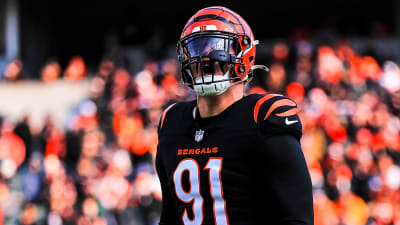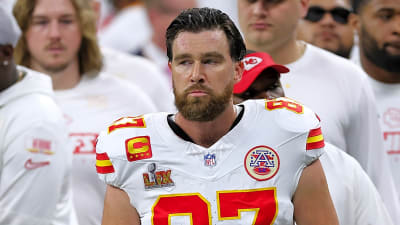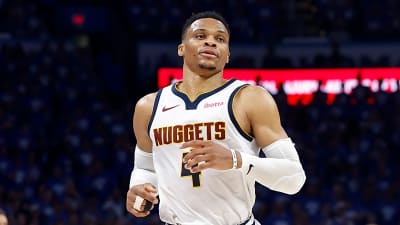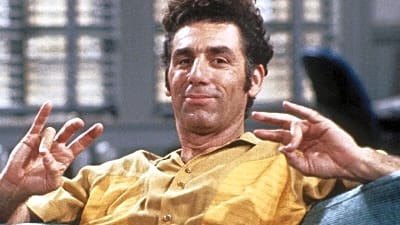In 2008, the Oklahoma City Thunder made their NBA debut as a newly located franchise from Seattle after spending 40 years in the city under the SuperSonics name. In their 57 seasons, there have been extreme highs and lows with the organization but none cut more deeply than the move from Seattle to Oklahoma City.
In 2008, the Oklahoma City Thunder made their NBA debut as a newly located franchise from Seattle after spending 40 years in the city under the SuperSonics name. In their 57 seasons, there have been extreme highs and lows with the organization but none cut more deeply than the move from Seattle to Oklahoma City.
Over the years, many iconic players built the franchise from the ground up. The 25 best players in their organization’s history make up what we refer to as the franchise’s GOAT pyramid. Since the Thunder and SuperSonics share franchise records, this GOAT pyramid will consist of players from both franchises who helped shape this team over the last six decades.
If you are unfamiliar with our GOAT Pyramid, there are examples below of every team we have covered thus far:
- The Los Angeles Lakers All-Time GOAT Pyramid
- The Chicago Bulls All-Time GOAT Pyramid
- The Golden State Warriors All-Time GOAT Pyramid
- The Boston Celtics All-Time GOAT Pyramid
- The Detroit Pistons All-Time GOAT Pyramid
- The Miami Heat All-Time GOAT Pyramid
- The Houston Rockets All-Time GOAT Pyramid
- The Brooklyn Nets All-Time GOAT Pyramid
- The New York Knicks All-Time GOAT Pyramid
- The Milwaukee Bucks All-Time GOAT Pyramid
- The Denver Nuggets All-Time GOAT Pyramid
- The Orlando Magic All-Time GOAT Pyramid
- The Indiana Pacers All-Time GOAT Pyramid
The most important rule for every GOAT pyramid is that each player is considered only for their time with the specific franchise we are covering. For example, James Harden’s MVP season and scoring titles with the Rockets mean absolutely nothing when it comes to his ranking with the Oklahoma City Thunder.
Now that the rules are in place and the baseline has been established, let’s get into the Oklahoma City Thunder All-Time GOAT Pyramid.
Tier 5
Nick Collison, Derrick McKey, Tom Chambers, Sam Perkins
Tier 5 of the Thunder’s all-time GOAT pyramid kicks off with players who mean a lot to the franchise's fans and produce at exceptional levels on the court. Nick Collison spent his entire 14-year career with both the SuperSonics and Thunder from 2005 through 2018. He became a fan-favorite for his physical play and energy that radiated with everyone on the team For his career, Collison averaged 5.9 points and 5.2 rebounds per game for the franchise.
Derrick McKey was the SuperSonics’ ninth overall pick in the 1987 NBA Draft. McKey would spend the first six seasons of his career with the team from 1988 through 1993 averaging 13.9 points, 5.2 rebounds, and 1.2 steals per game. While his offense was average, his defense is what made him a franchise legend, going to battle with the best players in the NBA on a nightly basis.
Tom Chambers also had a short five-year stay with the SuperSonics from 1984 through 1988. Chambers averaged 20.4 points and 6.6 rebounds per game during those five seasons while shooting 46.9% from the field. In 1987, he would earn the only All-Star selection of his career in a Seattle uniform with 23.3 points, 6.6 rebounds, and 1.0 steals per game while starting all 82 games for them at power forward.
The final member of Tier 5 is one of the prototypes of the modern-day perimeter big man, Sam Perkins. Armed with an automatic jump shot, Perkins played five-plus seasons with Seattle from 1993 through 1998. During this time, he averaged 11.1 points and 4.2 rebounds per game while shooting 44.0% overall and 38.2% from three. Perkins would be a major part of Seattle’s run to the 1996 NBA Finals where they lost to the Bulls in six games.
Tier 4
James Harden, Paul George, Steven Adams, Rashard Lewis, Xavier McDaniel
I know I will hear a lot about my placement of James Harden on this list but I am not afraid of it. Sure, James Harden was the Sixth Man of the Year in 2012 with the Thunder and helped them go on a run to the NBA Finals. With only three years with the teams and no All-Star or All-NBA Team selections before going to Houston, How am I supposed to put him any higher? He averaged 12.7 points and 2.5 assists per game in those three seasons as well. If anything, I may have him too high.
The same argument can be used for Paul George’s time with the Oklahoma City Thunder. Sure, George was a top-three MVP and Defensive Player of the Year candidate in 2019 with the Thunder but two seasons with a team isn’t going to move the needle too much with a franchise unless you are Kawhi Leonard with the Raptors. In those two seasons, George averaged 25.0 points, 6.9 rebounds, and 2.1 steals per game while earning two All-Star selections, two All-NBA Team selections, and one All-Defensive Team selection.
Steven Adams was another fan-favorite with the Oklahoma City Thunder from 2014 through 2020. Adams was the team’s enforcer and filled the role perfectly, often portrayed as one of the strongest men in the NBA thanks to his ability to clear out on-court issues promptly. In seven seasons with the teams, he averaged 9.8 points, 7.6 rebounds, and 1.0 blocks per game while bearing the physical toll his play style took on his body for 530 games.
Rashard Lewis was at his absolute best with the Seattle SuperSonics from 1999 through 2007. Lewis was a sharpshooting forward whose length contributed to stifling defensive play more often than not as well. In his nine seasons with Seattle, Lewis averaged 16.6 points, 5.8 rebounds, and 1.1 steals per game. He would make one All-Star team in 2005 and record three straight 20.0 points per game seasons from 2005 through 2007.
The final member of Tier 4 in Oklahoma City Thunder history is SuperSonics legend Xavier McDaniel. As their fourth overall pick in 1985, McDaniel spent five-plus seasons with the team from 1986-1991 where he averaged 20.7 points, 7.0 rebounds, and 1.2 steals per game. McDaniel would be an All-Star in 1988 and record four straight 20.0 points per game seasons from 1987 through 1990.
Tier 3
Ray Allen, Shai Gilgeous-Alexander, Lenny Wilkens, Detlef Schrempf, Dale Ellis, Nate McMillan, Serge Ibaka
Tier 3 of the Thunder/SuperSonics GOAT pyramid is when we begin to reach elite levels of play from every star listed from here on out. Ray Allen was at the peak of his career in Seattle where he would spend four-plus seasons from 2003 through 2007. Allen was an All-Star every season he was in Seattle averaging 24.6 points, 4.6 rebounds, and 4.2 assists per game on 38.6% from three and 44.0% overall.
Over the last few seasons with the Oklahoma City Thunder, Shai Gilgeous-Alexander has become a superstar and one of the top point guards in the NBA. In five seasons with the team since 2020, he has averaged 25.1 points, 5.2 rebounds, and 5.1 assists per game while shooting 48.9% from the floor. In 2022-23, he earned his first All-Star and All-NBA First Team selection averaging 31.4 points per game on 51.0% shooting.
Before he was a legendary head coach, Lenny Wilkens was a hell of a point guard in the NBA from 1961 through 1975. Four of those seasons would come as a member of the Seattle SuperSonics from 1969 through 1972 when he averaged 19.5 points, 5.0 rebounds, and 9.0 assists per game on 43.6% shooting. In those four years, Wilkens would earn three All-Star selections and an All-Star Game MVP award in 1971.
Detlef Schrempf may just be one of the most underrated players in NBA history. Schrempf was a key part of the SuperSonics from 1994 through 1999. He averaged 16.6 points, 6.3 rebounds, and 4.0 assists per game in his Seattle career, shooting 49.4% overall and 41.4% from three. Schrempf would earn two All-Star selections and an All-NBA Team selection with Seattle in 1995. In 1996, Schrempf helped the Sonics reach the NBA finals with 16.0 points and 5.0 rebounds per game throughout the playoffs.
Former Fadeaway World guest Dale Ellis also makes his way into Tier 3 for his impressive yet short display of work with the Seattle SuperSonics from 1987 to 1991. In seven total seasons with Seattle, Ellis averaged 20.9 points per game while shooting 49.8% overall and 41.8% from three. Ellis would earn an All-Star selection with the team in 1989 as well as an All-NBA Team selection. From 1987 through 1990, Ellis averaged over 23.5 points per game every season with Seattle.
Next in Tier 3 for the Seattle SuperSonics is Nate McMillan. Before he was a coach in the NBA, McMillan was a defensive savant in the NBA from 1987 through 1998. He played his entire career with the SuperSonics averaging 5.9 points, 4.0 rebounds, 6.1 assists, and 1.9 steals per game. McMillan would earn two All-Defensive Team selections in his career with Seattle and led the NBA in steals in 1994 with 3.0 steals per game.
Serge Ibaka was one of the NBA’s premier defensive players with the Oklahoma City Thunder from 2010 through 2016. In seven seasons with the team, Ibaka won the blocks title with over 3.0 blocks per game in 2012 and 2013 while also making three All-Defensive Teams in the process. In seven years with the Thunder, Ibaka averaged 11.6 points, 7.4 rebounds, and 2.5 blocks per game, anchoring one of the NBA’s top interior defenses for years.
Tier 2
Dennis Johnson, Shawn Kemp, Gus Williams, Spencer Haywood, Jack Sikma
Tier 2 brings to us the greatest players in Seattle SuperSonics/Oklahoma City Thunder history who are not considered to be the franchise GOATs. Dennis Johnson is the leader of Tier 2 as the only Finals MVP in franchise history. Johnson spent four seasons with the SuperSonics from 1977 through 1980 where he earned two All-Star selections, two All-Defensive Team selections, and one All-NBA team selection. In 1979, Johnson led Seattle to their only title in franchise history and took home Finals MVP honors averaging 22.6 points, 6.0 rebounds, 6.0 assists, 1.8 steals, and 2.2 blocks per game.
Shawn Kemp was the most electric athlete not named Michael Jordan during the 1990s. Kemp played eight seasons with Seattle from 1990 through 1997 where he went on to average 16.2 points, 9.6 rebounds, 1.2 steals, and 1.5 blocks per game in his career. Along with five All-Star selections and three All-NBA Team selections, Kemp would help lead the SuperSonics to the 1996 NBA Finals where he would have been Finals MVP if Seattle could have pulled off the upset over Michael Jordan’s Bulls.
Gus Williams was a teammate of Dennis Johnson’s who helped lead Seattle to the 1979 NBA title. Williams played six seasons with Seattle from 1978 through 1984, missing one full season due to a holdout in 1981. Williams earned two All-Star and two All-NBA Team selections in his Seattle career as well as the 1982 Comeback Player of the Year. He averaged 20.3 points, 6.0 assists, and 2.3 steals per game in his SuperSonics career as well as 29.0 points per game in the 1979 Finals to help them capture the NBA title.
NBA fans and players alike have a ton to thank Spencer Haywood for his work in getting the NBA to allow players to leave college early to join the pro ranks. On the court, he was just as impactful, especially in his five years in Seattle from 1971 through 1975. During that time, Haywood was a four-time All-Star who averaged 24.9 points, 12.1 rebounds, and 1.5 blocks per game with four All-NBA Team selections to his name as well.
The next member of Tier 2 is another lifetime member of the Seattle SuperSonics, Fred Brown. He spent all 13 seasons of his career with Seattle and averaged 14.6 points per game on 47.8% shooting. Brown was a one-time All-Star in 1976 averaging over 23.0 points and 1.9 steals per game. In 1979, Brown helped lead Seattle to their only title in franchise history and had his No. 32 retired by the team forever.
The final member of Tier 2 is a nine-year veteran of the SuperSonics from 1978 through 1986, Jack Sikma. In his nine seasons with the team, Sikma helped the team win an NBA title in just his second season starting all 82 games at center. Sikma would become a seven-time All-Star with Seattle, averaging 16.8 points, 10.8 rebounds, 1.1 steals, and 1.0 blocks per game during his career there.
Tier 1
Russell Westbrook, Kevin Durant, Gary Payton
Tier 1 consists of three players who all can be considered the greatest to ever play for the franchise. Russell Westbrook made history for the Thunder in his 11 seasons with the team from 2009 through 2019. Westbrook was named MVP of the league in 2017 when he became the first player since Oscar Robertson to average a triple-double for an entire season. Westbrook also earned two scoring titles, two assists titles, eight All-Star appearances, and eight All-NBA Team selections with the Thunder in his career there.
As expected, Kevin Durant is also among the greatest three players to play with the Oklahoma City Thunder. In his nine seasons with the team from 2008 through 2016, Durant was a four-time scoring champion and a league MVP in 2014. Durant averaged 27.4 points, 7.0 rebounds, 1.2 steals, and 1.0 clocks per game with the Thunder on 48/38/88 shooting splits over nine years. Durant would also lead them to the 2012 NBA Finals and go down in franchise history before committing an act of treason and leaving for Golden State in the Summer of 2016.
The final member of the GOAT tier for the Seattle SuperSonics and Oklahoma City Thunder is none other than The Glove himself, Gary Payton. As the greatest defensive point guard of all time, Payton made a name for himself with the SuperSonics from 1991 through 2003 with the franchise. Payton was the first point guard in NBA history to win Defensive Player of the Year in 1996, a season in which he led Seattle to the NBA Finals. In 12-plus seasons, Payton averaged 18.2 points, 4.2 rebounds, 7.4 assists, and 2.1 steals per game while earning nine All-Star selections, nine All-NBA Team selections, and nine All-Defensive Team selections in his time there.
More must-reads:
- Report: Celtics could listen to offers for two key starting players
- Knicks' stance on potential Kevin Durant trade revealed
- The 'Most points in Game 1 of an NBA Finals' quiz
Breaking News
Trending News
Customize Your Newsletter
 +
+
Get the latest news and rumors, customized to your favorite sports and teams. Emailed daily. Always free!







